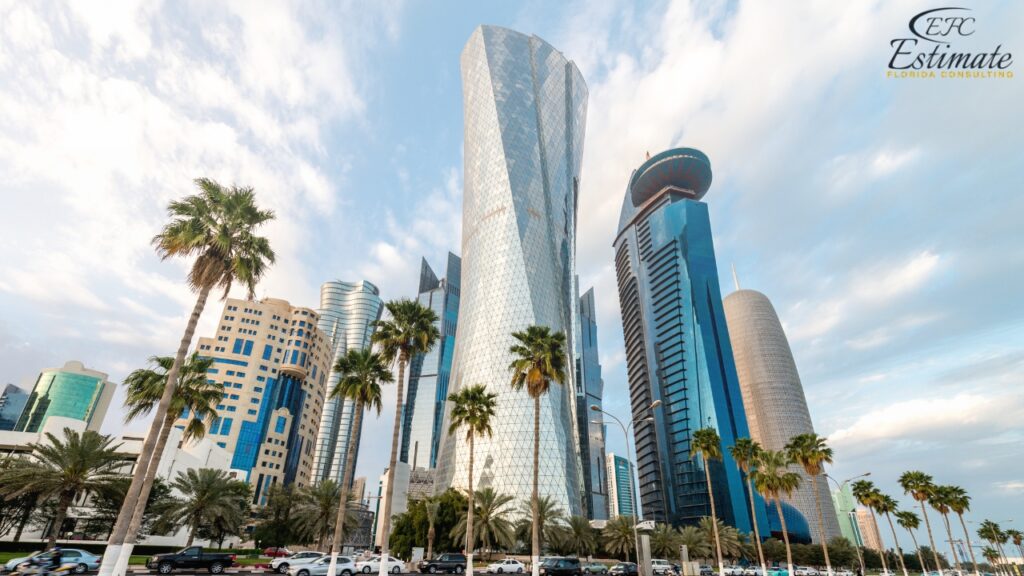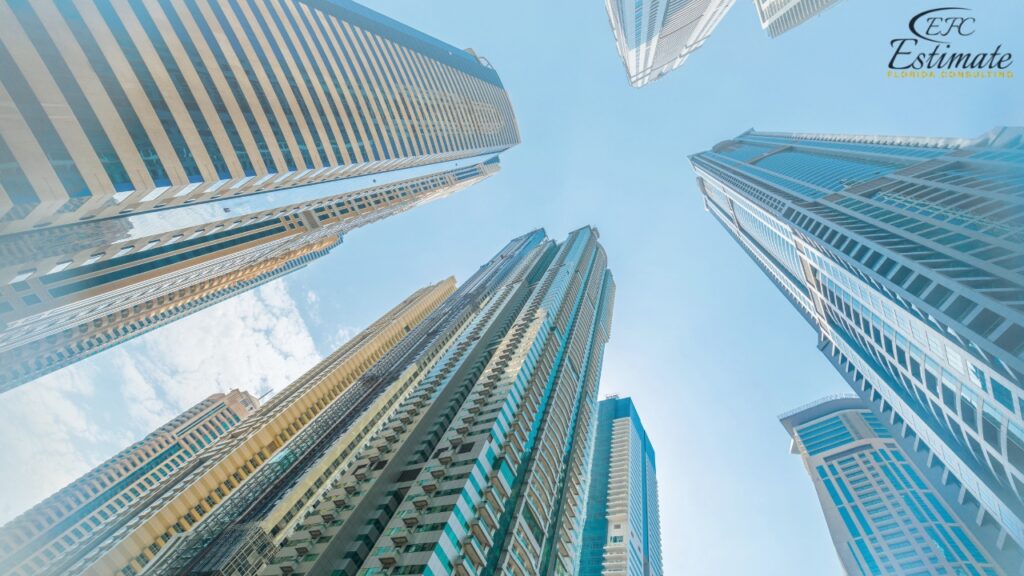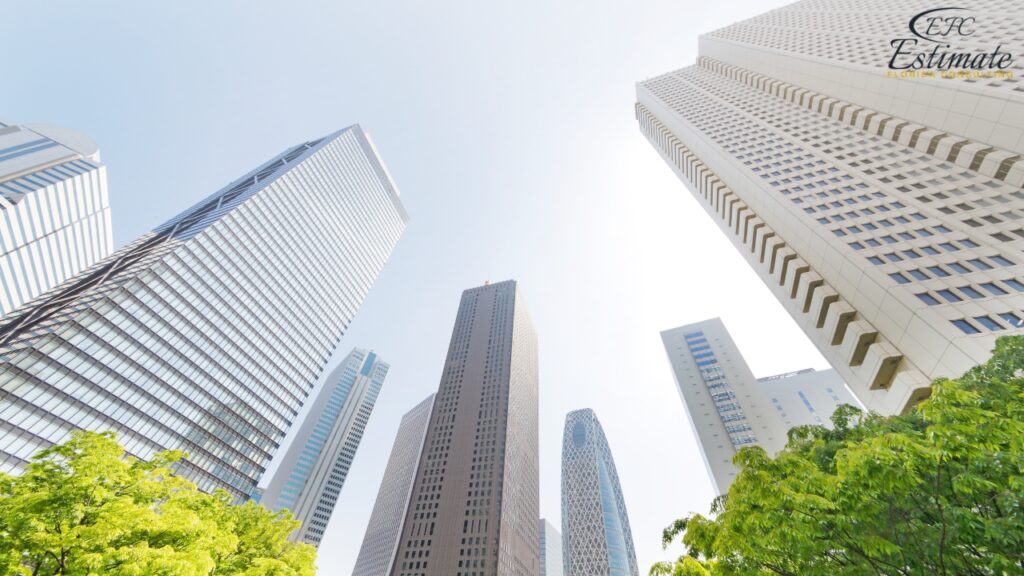How Much Does it Cost to Build a 50-Story Skyscraper?
Building a 50-story skyscraper involves significant financial considerations. Our average cost per square foot ranges from $350 to $800, ensuring flexibility to meet various project needs and specifications with tailored estimates. Estimating the total project cost is crucial for comprehensive financial planning. At Estimate Florida Consulting, we provide detailed projections that account for factors like location, materials, and design complexities. The total projected cost to construct a 50-story skyscraper typically ranges from $115 million to $520 million, reflecting the scale and intricacies involved in high-rise construction. This range allows clients to plan effectively and make informed decisions throughout the planning and execution phases of their ambitious projects.

Factors Influencing Cost
Location
The location of a skyscraper project profoundly influences its construction costs. Urban centers with high real estate values and stringent building codes generally incur higher costs compared to suburban or rural areas. Factors such as land availability, zoning laws, and proximity to amenities also play crucial roles in cost determination. Additionally, urban projects may require additional expenditures for traffic management, noise reduction measures, and logistical challenges due to limited space for equipment and materials staging.
Materials
Selecting appropriate materials is crucial for ensuring the durability, aesthetics, and sustainability of skyscrapers. High-quality materials are essential for structural integrity but often come with a premium price. Moreover, the increasing emphasis on sustainable construction practices adds another layer of cost consideration. Eco-friendly materials and technologies, while beneficial in the long run for energy efficiency and environmental impact, typically involve higher upfront costs. Balancing these considerations is key to optimizing material choices without compromising on project quality or long-term operational efficiency.
Design Complexity
The architectural and engineering complexity of skyscrapers significantly impacts construction costs. Unique designs and innovative structural solutions may necessitate specialized expertise, advanced technologies, and custom fabrication, all contributing to higher overall project expenses. Factors such as building height, facade design, and interior layout intricacies can further influence costs by requiring specialized materials or intricate construction techniques. Effective management of design complexity involves early collaboration between architects, engineers, and contractors to align creative vision with budget constraints.
Labor Costs
Skilled labor is indispensable for skyscraper construction, and labor costs vary widely based on geographical location, market demand, union regulations, and workforce availability. Major urban centers typically experience higher labor costs due to competitive wages, unionized workforces, and stringent safety regulations. Managing labor expenses while prioritizing workforce safety, productivity, and adherence to project timelines is essential for controlling overall construction costs. Strategies such as workforce training, efficient scheduling, and labor resource optimization can help mitigate the impact of labor costs on project budgets.
Cost Breakdown
Average Cost per Square Foot
The cost per square foot for constructing a skyscraper typically ranges between $350 and $800. This broad range reflects variations in factors such as material selections, labor rates, project scale, and location-specific challenges. Detailed cost breakdowns per construction phase—from foundation and structural framing to mechanical systems installation and interior finishes—enable accurate resource allocation and budget management throughout the project lifecycle.

Total Project Cost Range
Estimating the total cost of erecting a 50-story skyscraper involves meticulous planning and comprehensive forecasting. Depending on the aforementioned factors, total project costs generally span from $115 million to $520 million. This range encompasses preliminary design phases, regulatory approvals, construction activities, contingency provisions, and potential unforeseen expenses. It allows for flexibility in financial planning and risk management, accommodating uncertainties inherent in large-scale construction projects.
Flexibility in Estimates
Given the inherent complexities and uncertainties of skyscraper construction, flexibility in cost estimation is paramount. Proactive contingency planning for potential risks such as material price fluctuations, regulatory changes, and unexpected delays helps mitigate financial vulnerabilities. Regular updates to cost projections based on real-time data, market trends, and project-specific developments enhance transparency and resilience in managing budgetary challenges throughout the construction process.
Challenges in Cost Estimation
Fluctuations in Material Costs
Global supply chain disruptions and fluctuations in raw material prices pose significant challenges to cost estimation in skyscraper projects. Securing materials at stable prices through strategic procurement strategies is crucial. This includes establishing long-term contracts with suppliers and closely monitoring market trends to anticipate and mitigate cost volatility. For instance, leveraging alternative materials or adjusting construction schedules based on market conditions can help manage budget fluctuations more effectively.
Regulatory Requirements
Navigating regulatory frameworks is a critical aspect of skyscraper construction, adding layers of complexity to project planning and cost estimation. Obtaining permits, conducting environmental assessments, and ensuring compliance with safety standards are essential steps. These regulatory processes not only impact project timelines but also introduce compliance costs that must be factored into the budget. Collaborating closely with regulatory authorities from the outset helps streamline approval processes and ensures that all legal requirements are met without unexpected delays or costs.
Get 5 New Leads Next 7Days With Our System
- Multi-Family Building
- Hotel Building
- Hospital Building
- Warehouse Building
- High-Rise Building
- Shopping Complex
Project Delays
Delays in skyscraper construction can stem from a variety of factors beyond anyone’s control, such as adverse weather conditions, labor strikes, or logistical challenges. Implementing robust delay mitigation strategies is essential to minimize financial impacts and maintain project continuity. This may involve developing alternative scheduling scenarios, establishing clear communication channels among stakeholders, and maintaining flexible contractual arrangements with suppliers and subcontractors. Additionally, having contingency plans in place for unexpected disruptions helps mitigate risks and ensures that the project remains on track despite unforeseen circumstances.
Financial Planning Considerations
Budget Allocation
Effective budget allocation is fundamental to managing cash flow throughout the skyscraper construction process. Detailed cost estimates that account for all foreseeable expenses, periodic budget reviews to track expenditure against projections, and establishing contingency reserves are essential practices. These measures help stakeholders maintain financial discipline and respond effectively to unexpected costs or budgetary adjustments without jeopardizing the project’s overall timeline or quality standards.
Risk Management Strategies
Managing risks associated with cost overruns and schedule delays is crucial for the successful completion of skyscraper projects. Implementing comprehensive risk management strategies involves identifying potential threats early in the planning stages, assessing their potential impact on the project, and developing proactive risk mitigation plans. This may include diversifying suppliers, securing appropriate insurance coverage against potential losses, and establishing clear protocols for managing unforeseen circumstances. By addressing risks proactively, stakeholders can enhance project resilience and minimize the likelihood of costly disruptions during construction.

Sustainability Initiatives
Green Building Certifications
Incorporating green building certifications such as LEED (Leadership in Energy and Environmental Design) into skyscraper projects demonstrates a proactive approach to sustainability. These certifications evaluate the building’s environmental performance across various criteria, including energy efficiency, water conservation, materials selection, and indoor environmental quality. Achieving LEED certification or similar standards not only enhances the project’s reputation but also signifies a commitment to reducing environmental impact and improving occupant well-being. Benefits extend beyond construction, encompassing operational phases with lower utility costs, reduced waste generation, and potential incentives or rebates from local governments for sustainable practices.
Long-Term Cost Savings
While upfront costs for sustainable skyscrapers may initially exceed those of conventional buildings, the investment typically pays off through substantial long-term savings. Energy-efficient designs and technologies result in lower utility bills over the building’s lifespan. Reduced water consumption and maintenance requirements further contribute to ongoing operational savings. Additionally, sustainable buildings often command higher resale or rental values due to their lower operating costs and appeal to environmentally conscious tenants or investors. This improved marketability enhances the building’s financial viability and resilience against fluctuating energy prices and regulatory changes. Embracing sustainability not only aligns with global environmental goals but also proves advantageous from a financial standpoint, promoting economic efficiency and long-term profitability in skyscraper development.
Download Template For Skyscraper Project Breakdown
- Materials list updated to the zip code
- Fast delivery
- Data base of general contractors and sub-contractors
- Local estimators

Conclusion
Building a 50-story skyscraper demands meticulous planning, substantial investments, and a nuanced understanding of cost dynamics. By addressing factors such as location advantages, material choices, design complexities, and labor efficiencies, stakeholders can navigate challenges effectively and achieve successful project outcomes.
For those contemplating ambitious skyscraper projects, proactive cost management, risk mitigation strategies, and sustainable development practices are essential for achieving economic viability and community impact.
FAQs
Building a 50-story skyscraper involves significant financial considerations. The average cost per square foot ranges from $350 to $800, allowing for tailored estimates based on project needs and specifications. At Estimate Florida Consulting, we provide detailed cost projections that consider factors such as location, materials, and design complexities. The total projected cost typically ranges from $115 million to $520 million, reflecting the scale and intricacies of high-rise construction. This range enables effective financial planning throughout all phases of the project.
Several factors impact the cost of skyscraper construction:
- Location: Urban centers with high real estate values and strict building codes incur higher costs. Factors like land availability, zoning laws, and proximity to amenities also play crucial roles.
- Materials: Choosing durable and sustainable materials affects both upfront costs and long-term operational savings.
- Design Complexity: Unique architectural and engineering designs may require specialized expertise and materials, contributing to higher expenses.
- Labor Costs: Skilled labor costs vary by location and market conditions, influencing overall construction expenditures.
Cost breakdown in skyscraper construction includes:
- Average Cost per Square Foot: Typically ranges from $350 to $800, covering materials, labor, and overhead expenses.
- Total Project Cost Range: Estimated between $115 million to $520 million, encompassing design, regulatory approvals, construction phases, contingencies, and unforeseen expenses.
- Flexibility in Estimates: Essential due to uncertainties such as material price fluctuations and regulatory changes, managed through proactive contingency planning and regular cost updates.
Challenges include:
- Fluctuations in Material Costs: Global supply chain disruptions affect raw material prices.
- Regulatory Requirements: Navigating permits, environmental assessments, and safety standards adds complexity and costs.
- Project Delays: Weather conditions, labor strikes, and logistical issues can impact timelines and budgets.
- Risk Management: Identifying and mitigating risks associated with cost overruns and delays is crucial for project success.
Benefits include:
- Green Building Certifications: Such as LEED, demonstrate commitment to energy efficiency, water conservation, and indoor air quality.
- Long-Term Cost Savings: Despite higher initial costs, sustainable practices lead to lower utility bills, reduced maintenance, and enhanced property value.
- Marketability: Sustainable buildings appeal to environmentally conscious tenants and investors, potentially commanding higher resale or rental values.
Google Reviews



Process To Get It Cost To Build a 50-Story Skyscraper Estimate Report
Here I am going to share some steps to get it cost to build a 50-story syscraper estimate report.
-
You need to send your plan to us.
You can send us your plan on info@estimatorflorida.com
-
You receive a quote for your project.
Before starting your project, we send you a quote for your service. That quote will have detailed information about your project. Here you will get information about the size, difficulty, complexity and bid date when determining pricing.
-
Get Estimate Report
Our team will takeoff and estimate your project. When we deliver you’ll receive a PDF and an Excel file of your estimate. We can also offer construction lead generation services for the jobs you’d like to pursue further.

